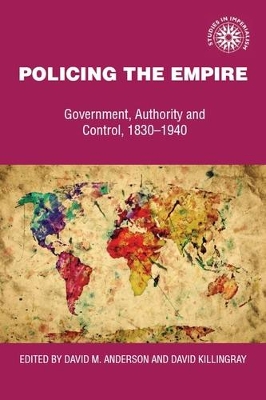Studies in Imperialism
2 total works
Established in the belief that imperialism as a cultural phenomenon had as significant an effect on the dominant as it did on the subordinate societies, the "Studies in Imperialism" series seeks to develop the new socio-cultural approach which has emerged through cross-disciplinary work on popular culture, media studies, art history, the study of education and religion, sports history and children's literature. The cultural emphasis embraces studies of migration and race, while the older political, and constitutional, economic and military concerns are never far away. It incorporates comparative work on European and American empire-building, with the chronological focus primarily, though not exclusively, on the 19th and 20th centuries, when these cultural exchanges were most powerfully at work. This work, part of a series on the British Empire, covers and compares the different ways and means that were employed in policing policies from 1830 to 1940. Countries covered range from Ireland, Australia, Africa and India to New Zealand and the Caribbean.
The book, in line with the direction of the series as a whole, is concerned with cross-cultural matters, drawing in the social and political effects of the topics under review.
The book, in line with the direction of the series as a whole, is concerned with cross-cultural matters, drawing in the social and political effects of the topics under review.
For imperialists, the concept of guardian is specifically to the armed forces that kept watch on the frontiers and in the heartlands of imperial territories. Large parts of Asia and Africa, and the islands of the Pacific and the Caribbean were imperial possessions. This book discusses how military requirements and North Indian military culture, shaped the cantonments and considers the problems posed by venereal diseases and alcohol, and the sanitary strategies pursued to combat them. The trans-border Pathan tribes remained an insistent problem in Indian defence between 1849 and 1947. The book examines the process by which the Dutch elite recruited military allies, and the contribution of Indonesian soldiers to the actual fighting. The idea of naval guardianship as expressed in the campaign against the South Pacific labour trade is examined. The book reveals the extent of military influence of the Schutztruppen on the political developments in the German protectorates in German South-West Africa and German East Africa. The U.S. Army, charged with defending the Pacific possessions of the Philippines and Hawaii, encountered a predicament similar to that of the mythological Cerberus. The regimentation of military families linked access to women with reliable service, and enabled the King's African Rifles to inspire a high level of discipline in its African soldiers, askaris. The book explains the political and military pressures which drove successive French governments to widen the scope of French military operations in Algeria between 1954 and 1958. It also explores gender issues and African colonial armies.

